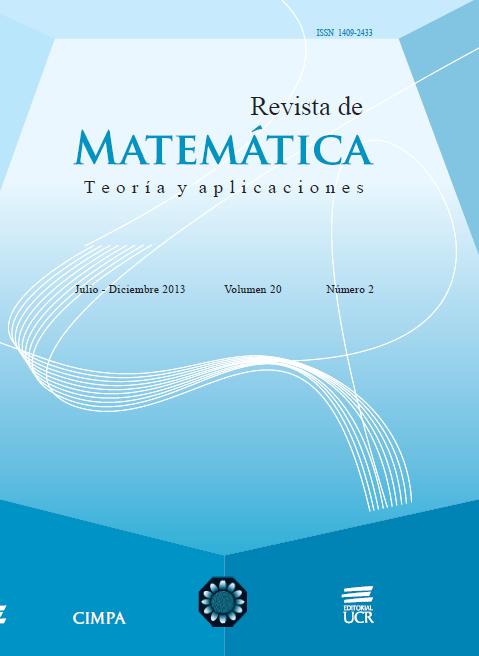Abstract
The aim of this study is to disseminate the academic community a prototype computer that automatically generates simulation models of a given industrial production system, in order to facilitate the learning of some deterministic and stochastic scheduling. The basic architecture of the prototype computer developed in terms of presentation layers, processing and storage. Through the processing layer generates a prototype simulation model which is stored in the storage layer and subsequently can be run in order to test various models of production scheduling system. Scheduling theory has led to alternatives to generate the best solutions to problems of production scheduling and intends to develop this software to test some of these alternatives by computer simulation. Among the benefits that simulation brings is the ability to assess the impact that decisions
Rev.Mate.Teor.Aplic. (ISSN 1409-2433) Vol. 20(2): 231–241, July 2013 generador de modelos de simulacion 233 will, in order to have an approach to reality to evaluate decisions in order to take more assertive. To test prototype was used as the modeling example of a production system with 9 machines and 5 works as a job shop configuration, testing stops processing times and stochastic machine to measure rates of use of machines and time average jobs in the system, as measures of system performance. This test shows the goodness of the prototype, to save the user the simulation model building
References
Castrillón, O.D.; Giraldo, J.A.; Sarache, W.A. (2009) Técnicas de Programación de la Producción. Aplicaciones en Ambientes Job Shop. Unibiblos. Bogotá, Colombia.
Castrillón, O.D.; Giraldo, J.A.; Sarache, W.A. (2010) Técnicas Inteligentes y Estocásticas en Scheduling. Un Enfoque en la Producción y las Operaciones. Unibiblos, Bogotá, Colombia.
Domı́nguez, J.A.; Álvarez A.; Domı́nguez M.A.; García, S.; Ruiz, A. (1995) Dirección de Operaciones. Aspectos Estratégicos en la Producción y los Servicios. Mac Graw Hill, Madrid.
Graham, R.L.; Lawler, E.L.; Lenstra, J.K.; Rinooy Kan, A.H.G. (1979) Optimization and aproximation in deterministic sequencing and scheduling: a survey. Annals of Discrete Mathematics 5: 287–326.
Leung, J.; Pinedo, L. (2003) “Minimizing total completion time on parallel machines with deadline constraints”, SIAM Journal Computing 32(5): 1370–1388
Miltenburg, J. (2005) Manufacturing Strategy. How to Formulate and Implement a Winning Plan. Productivity Press, Portly OR.
Russell, R.; Taylor III, B. (2003) Operations Management, 4th Ed. Prentice Hall, New Jersey.

This work is licensed under a Creative Commons Attribution-NonCommercial-ShareAlike 4.0 International License.
Copyright (c) 2013 Omar Danilo Castrillón, Jaime Alberto Giraldo, William Ariel Sarache
